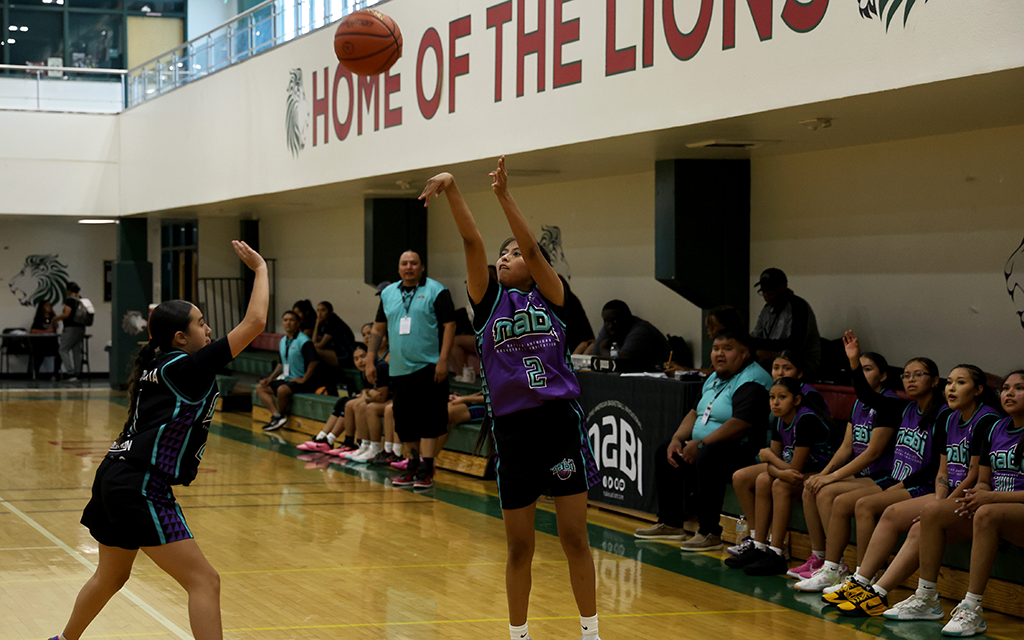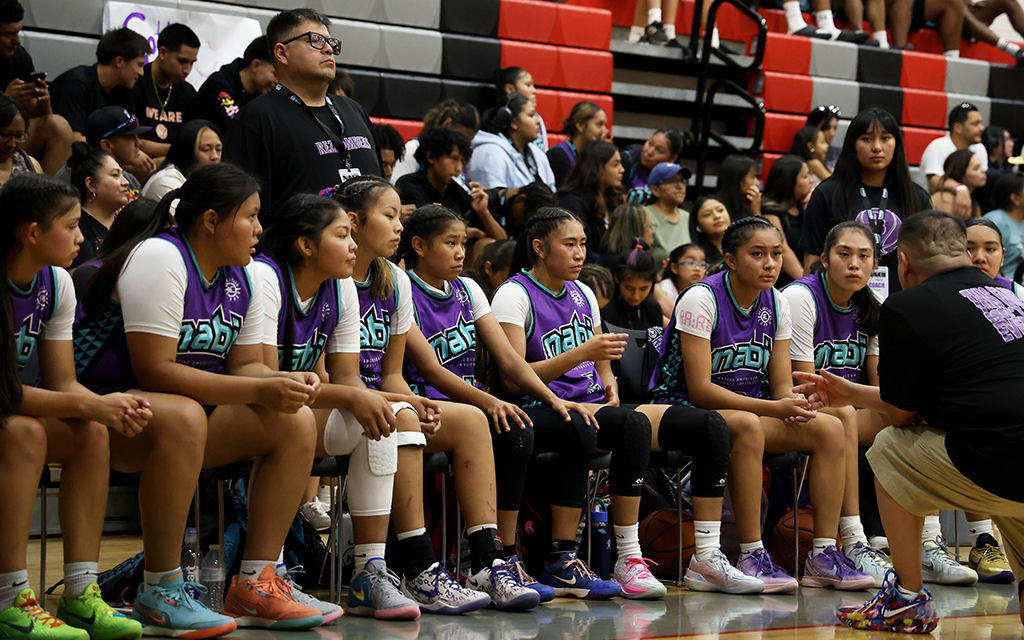
Hannah Quintera shoots a 3-pointer during the opening round of pool play against the Lady Akichita at Alhambra High School during the Native American Basketball Invitational. (Photo by Travis Bradley/Cronkite News)
PHOENIX — One thing is for certain, when the Native American Basketball Invitational (NABI) comes to town, there are no shortages of fascinating storylines and compelling narratives to explore.
The 22nd annual all-native basketball tournament — the largest of its kind in North America — brought more than 200 teams from across the United States to several Valley arenas last week. The tournament is not simply about basketball; it is also about celebrating cultural diversity, Native identities and heritage.
With over 160 tribal nations represented across both the girls and boys divisions, high school and soon-to-be college athletes took to the courts to hopefully distinguish themselves as the best Native basketball teams in the country.
From the Athabascan tribes of Alaska to the Otoe-Missouria of Oklahoma, basketball reigns as one of the premier sports for Native youth.
New faces, same expectations
More than 80 of the teams in the 2025 NABI tournament were representatives of the 22 federally recognized tribes in Arizona.
The Spartans, a boys division team composed of young Navajo and Mohave players from Northern Arizona, were led into the tournament by Farin Nez, who recently took over the coaching position.
Nez said the Spartans were united under the cause of making their former coach Samuel David proud. David, a “lifelong friend” to Nez, died in July.
“Coach Sam really put a good foundation underneath them, such as rebounding and trust moving the ball,” said Nez, tears welling in his eyes as he reminisced about his now-deceased mentor. “This is our first tournament since his passing, and I’m just trying to continue what he started.”

The Spartans defeated War Paint at the Phoenix College gymnasium, 61-18, in the Native American Basketball Invitational. (Photo by Travis Bradley/Cronkite News)
The Spartans were led offensively by Jacoby Che, a 14-year-old point guard. Che is Navajo from Winslow, Arizona, and he’s heading into ninth grade in the fall.
Despite his stature and youth, Che’s offensive output led the Spartans to the second round of tournament play before eventually falling to the Snowbirds of the Native Village of Scammon Bay in Alaska.
“We learned to play more physically because we’re always playing against bigger, older guys.” Che said.
Che will team up with several of the Spartan players this winter once the high school basketball season begins.
Age-old rivalries are renewed
With basketball as prevalent as it is throughout the Native tribes in Arizona, it can be difficult to isolate just one roster of talented players per tribe.
The White Mountain Apache Tribe had five teams representing their community in the girls division, and another nine teams in the boys division.
After a last-second victory over the Lady Akichita from North Dakota last Wednesday, WMA Squad coach Tyrell Clawson said that one motivating factor for the players was the opportunity to compete against teammates and high school rivals from other White Mountain teams at a national level.
“They support each other, the communities are always behind them, and there’s some really big crowds here to watch,” Clawson said.
Clawson is only 25, and this is his first season as a head basketball coach. With the way his team responded to his direction, it was impossible to tell that he was one of the least-experienced coaches in the tournament.
Clawson attributed the sisterhood between teammates as an essential part of the team’s success in the early stages of pool play. Though they lost in the first round of the tournament 41-37, the female athletes remained united by their common love for the game.
“They always encourage each other,” Clawson said. “Before, they came as teammates, now they’re basically a family.”
A dynasty is forged
No team has had nearly the same success in the recent years of the tournament as the Rezbombers in the girls division.
Represented by athletes from the Navajo Nation, Samoan, Laguna Pueblo, Hualapai, Paiute and Oglala Sioux tribes, the players barrelled through much of their competition last week, posting scores as lopsided as 110-20 throughout pool and tournament play.

Rezbombers coach Brian Kaye addresses his team during halftime of a pool play game at Central High School on Thursday, July 24, 2025. (Photo by Travis Bradley/Cronkite News)
Rezbombers coach Brian Kaye brings a level of intensity to the game that is often unmatched by his opponents. Having won the tournament in 2024, he knew there was a very narrow margin of error for the players if they wanted to become repeat champions.
“This is by far the biggest tournament we’ll play in this year, and we take extreme pride in playing in this tournament,” Kaye said. “It’s one way for us to represent our culture, and we just want outsiders to know that Native Americans can play basketball.”
Kaye said that the main ingredient for the team’s success is discipline, especially on the defensive side of the ball. And when you’re beating a team 75-5 in pool play, it goes without saying that the players maintained that discipline throughout the tournament.
Led mainly by the Benally sisters, Sydney and Kaiyah, the Rezbombers surged their way to the championship on Saturday evening, claiming their third NABI title since 2022.
Kaiyah, the younger of the two sisters, is a 5-foot-6 point guard and one of the most talented female basketball players in New Mexico. Her older sister, Sydney, is a two-time New Mexico Gatorade Player of the Year, and she’s heading to BYU in the fall to join the Cougars’ women’s basketball team.
“It means a lot (to play in this tournament),” Sydney said. “Not only am I playing with such great players, but I’m playing with my sister one last time before I head off to college.”
When the trio of Kaye and the two Benally sisters were asked what it meant to them to play together one last time, their answers were all the same:
“It’s been a blessing” they said, echoing the theme that was prevalent throughout Valley arenas.
Follow Cronkite News: Phoenix Sports on Twitter.